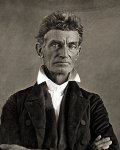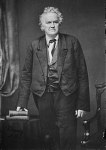
John Brown
As January turned to February, back in 1856, John Brown wanted to know what Congress meant to do about Kansas. He suffered bitterly from homesickness and the news of the murder of an antislavery man on the heels of rumors that Missouri would come back can’t have helped his state of mind. Nor could word from the President of the United States that he considered Brown and the free state movement dirty traitors who needed suppression. He wrote home anxiously about the situation. As a frequent Ohioan of antislavery bent, Brown had long followed the career of Joshua Giddings. The two men had met previously and Brown expressed his admiration then. Now he turned his pen to learning what Congress might do from an actual congressman.
I write to say that a number of United States Soldiers are quartered in this vicinity for the ostensible purpose of removing intruders from certain Indian Lands. It is, however, believed that the Administration has no thought of removing the Missourians from the Indian Lands; but that the real object is to have these men in readiness to act in the enforcement of those Hellish enactments of the (so called) Kansas Legislature; absolutely abominated by a great majority of the inhabitants of the Territory; and spurned by them up to this time. I confidently believe that the next movement on the part of the Administration and its Proslavery masters will be to drive the people here, either to submit to those Infernal enactments; or to assume what will be termed treasonable grounds by shooting down the poor soldiers of the country with whom they have no quarrel whatsoever.
Emphasis Brown’s.

Joshua Giddings (R-OH)
Brown asked, essentially, if Giddings thought that Franklin Pierce meant his declaration of war. Would soldiers dispatched, officially, to preserve Indian reservations instead be used to force white men to submit to proslavery tyranny? He thought so, warning Giddings that if things went that way antislavery Kansans would probably take up arms against the Army.
Or at least that Brown might; the free state leadership consistently chose otherwise. The rank and fire antislavery men of the territory might go either way. They proved receptive to Brown’s style of militancy and did suffer under a genuine, often present threat to their lives and property. Such things can drive one to extreme measures. Brown had charisma and clarity of vision. With their backs to the wall and the regular leadership trying to navigate some kind of politically prudent, emotionally unsatisfying course many might choose to follow the straight talking old man from Osawatomie.
Immediately thereafter Brown begs Giddings “in the name of Almighty God,” “our venerated fore-fathers,” and “all that good or true men ever held dear” would Congress go along with that?
Advertisements Share this:





